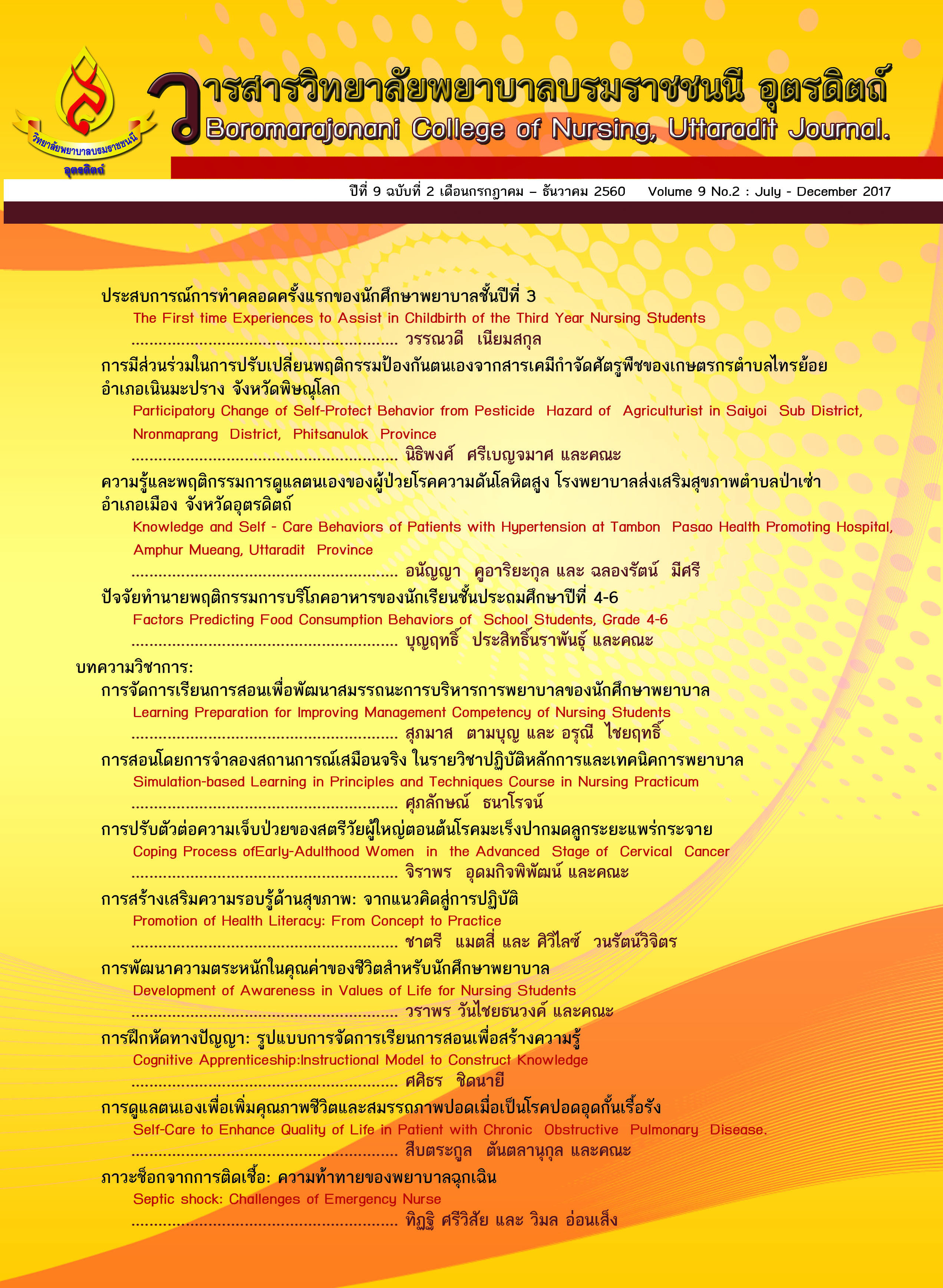ปัจจัยทำนายพฤติกรรมการบริโภคอาหารของนักเรียนชั้นประถมศึกษาปีที่ 4-6
Main Article Content
บทคัดย่อ
This correlation predictive research aimed to study factors predicting food consumption behaviors of school students grade 4-6, elementary school of Municipality School. The samples were 104 school students grade 4-6. The questionnaires were adapted from Kaewprom, S. (2006) based on PRECEDE. The questionnaires are as follow: food consumption knowledge, food consumption attitude, influence of friends and food consumption behaviors. Data were analyzed for its internal consistency by Cronbach,s Alpha Coefficient results in the values of .60,.62, .71 and .73 respectively. Pearson,s product moment correlation coefficient, and stepwise multiple regression analysis were used. According to the findings, 55.8% of the samples were males and more than half of the students (56.7%) had normal nutritional status. The food consumption behaviors were of the sample at a moderate level (M = 2.22, SD = .21). The factors related to the food consumption behaviors are money support from parents (r = -.200, p < .05), food consumption attitude (r=.243, p<.5) and influence of friends (r = .407, p< .01 ). The results of multiple regression analysis founded that food consumption attitude and influence of friends could predict food consumption behaviors of school students grade 4-6 at the level of 20.4 (R2 = 0.204 , P<0.001). Based on the finding, nurse and health care provider should develop food consumption behavior program by encourage the attitudes of food consumption behavior and also the way of learning about it from influence of friends.
Article Details
บทความหรือข้อคิดเห็นใดใดที่ปรากฏในวารสารวิจัยการพยาบาลและวิทยาศาสตร์สุขภาพ เป็นวรรณกรรมของผู้เขียน ซึ่งบรรณาธิการหรือสมาคมศิษย์เก่า ไม่จำเป็นต้องเห็นด้วย และบทความที่ได้รับการตีพิมพ์เผยแพร่ถือเป็นลิขสิทธิ์ของวารสารวิจัยการพยาบาลและวิทยาศาสตร์สุขภาพ
เอกสารอ้างอิง
2. Bargiota, A., Delizona.M., Tsitouras, A., & Koukoulis, G. (2013) Eating habits and factors affecting food choice of adolescents living in rural areas Retrieved 10/06/2017 from http://www.hormones.gr/8409/article/eating-habits-and-factors-affectingfood%E2%80%A6.html.
3. Chaiyasung, P., Yakasem, P.,&Chuthongrat, N.(2014). Factors predicting food consumption behaviors of overweight elementary school students grad 4-6. The Journal of Boromarajonani of Nursing Nakhonratchasima. 20 (1): 30-42. (in Thai)
4. Child And YouthDevelopment Promotion Act B.E. 2007. (2008).ratchakitchanubeksa. 125 9 1.(in Thai)
5. Green, L. W., & Kreuter, M. W. (2005). Health Program Planning :An Eduational and Ecological Approach (4 thed). NewYork : McGraw - Hill Higher Education.
6. Jaichuen, N., (2013). Purchasing and eating of food and beverages in Primary 6 students. Journal of Health Systems Research. 7(1): 137-149 (in Thai)
7. Kaewprom, S. (2006). Food consumption behavior in a with the national health recommendations of Prathomsuksa 6 students in amphur Tasala, Nankhonsi Thammarat province. (Unpublished master, thesis). Srinakharinwirot University. (in Thai)
8. Moahmeng, N.,Yoncharoenlam, P.,& Phinit, S. ( 2014).The study of Nutrition & student’s food consumption behavior in Diamond Health Promoting Schools at Regional Heath Promotion center 9 Phitsanulok. Retrieved 22/06/2017, from http://hpc2.anamai.moph.go.th/ research/index.php/2558/108-9. (in Thai)
9. National Health Examination Survey Office. (2009).Thailand National Health Examination Survey IV 2008 - 2009. Bangkok: National Health Examination Survey Office. (in Thai)
10. Penpong, M. (2016). Food Consumption Behavior of Students in Suratthani Province. Journal of management Sciences. 3(1), 109-126. (in Thai)
11. Phromma, I. & Mueanphet, C. (2014).Factors affecting food consumption behavior according to national health mmendations among student of WatSrichandharam School in PathumThani Province. In Rethink : Social Development for Sustainability in ASEAN Community 11-13 June 2014.(Report). KhonKaen. (in Thai)
12. Rattanachuek, S. Thawikun, P., Iamophat, A., & Suthatwonwuthi, A.(2014). Guidelines for the prevention and treatment of obesity in children. Retrieved 2/06/2017, from http://www.thaipediatrics.org/Media/media20161208151655.pdf
13. Rattanasakhonchai, S. (2015) Factors affecting food consumption behavior of MathayomSuksa 3students in Muang Chumphon Distric Chumphon. FDA journal :Janunay - April 2015, 61-72 (in Thai)
14. Saritsiri, S. (2012). Study surveying the nutritional status of students in Taweewattana District, Bangkok. Journal of Public Health, 42(1): 76-89. (in Thai)
15. Sharifirad, G., Yarmohammadi, P. ,Azadbakht.L., Morowatisharifabad, M. & Hassanzadeh, A. (2013). Determinants of food consumption among Iranian high school students based on Planned behavior theory.Journal of obesity.2013 (id147589): 1-7.
16. Toathom, R.(2015). Factors relating to afterschool dietary behavior of students in Bangkok Noi District, Bangkok. Unpublished master, s (thesis). Kasetsart University. (in Thai)


